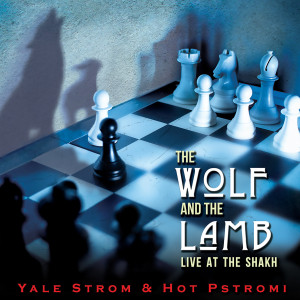 Klezmer music has a long and fascinating history, and it’s continuing to add to that history as a living art form. The violinist, composer and ethnographer Yale Strom has been one of its leading proponents, with his band Hot Pstromi, formed in 1981. To me klezmer reflects the incredible cultural variety of the Jewish diaspora, the way it draws from the cultures it rubs elbows with and yet maintains it own inviolable and recognizable core. That is definitely borne out by The Wolf and the Lamb.
Klezmer music has a long and fascinating history, and it’s continuing to add to that history as a living art form. The violinist, composer and ethnographer Yale Strom has been one of its leading proponents, with his band Hot Pstromi, formed in 1981. To me klezmer reflects the incredible cultural variety of the Jewish diaspora, the way it draws from the cultures it rubs elbows with and yet maintains it own inviolable and recognizable core. That is definitely borne out by The Wolf and the Lamb.
Hot Pstromi is an amazing band, a sextet consisting of Yale Strom on violin, Elizabeth Schwartz on vocals and hand percussion, Norbert Stachel on a variety of woodwinds including clarinet, flute, fife, piccolo, and sopranino and tenor saxophone, Peter Stan on accordion, Petr Dvorsky on contrabass and Aliaksandr Yasinski on accordion and vocals. Their playing reveals facets of jazz and classical forms as well as the various traditions of Central Europe: Ukrainian, Livonian, Belarusian, and Romani in addition to Askenazi Jews.
It was recorded live over two days at the Shakh Synagogue in Holešov in the Czech Republic, which has a long and complicated history of its own. The album itself is a generous and varied program of 14 songs lasting well over an hour. They range from the opening Hebrew prayer “V’zos Ha-Tora or This is the Torah,” which traditionally was recited to the congregation whenever the Torah was recited; to the Romany folk song “Song from Bihar” joyously sung by Schwartz and prominently featuring Strom’s violin and Stan’s accordion; to the American jazz standard, eden ahbez’s “Nature Boy” (first recorded by Nat “King” Cole) in its first translation and recording in Yiddish. I have to say it’s the first time I’ve truly appreciated this song, thanks to the great arrangement, Schwartz’s vocals, and Stachel’s lovely spiritual jazz flute solo. This song and its composer also have a long and amazing story which you should definitely look up.
For some great jazz-inflected accordion, check out “Vizhnitser Nign,” a traditional Yiddish song from the Bukovina region. Peter Stan really shines on this one, which is maybe the closest on the album to what I consider classic klezmer. Another standout song is the unusual waltz-time arrangement of the traditional Rosh Hashanah and Yom Kippur prayer “Avinu Malkeynu,” which the Roma heard in Moldova, adapted as their own, and then was borrowed back by Jewish musicians. And the program ends with, of all things, a tango, “Moises Ville.” It was composed by Strom in honor of the klezmer musicians who encountered tango in Paris during World War II having fled Eastern Europe, whom he notes “were already attuned to the minor keys and heart-breaking lyrics often played in tango.”
Two other songs composed by Strom are among my favorites. “Pilky,” which means “saw,” is patterned on a Czech melody and inspired by the Czech composer Leoš Janáček’s Lachian Dances. It’s arranged in sections that reflect the peasants dancing out in the morning to do their work of cutting firewood, then an arduous section reflecting the work taking place (with the rhythmic sawing supplied by Dvorsky on bowed bass and a soaring tenor solo by Stachel), followed by more joyous dancing as they return to the village. The other is “Pinsk Floyd,” inspired by a hurdy-gurdy busker on the streets of Pinsk, Belarus.
The album package is beautifully put together with high quality art and a wealth of information about the music as a whole and each track individually. Yale Strom & Hot Pstromi’s The Wolf and the Lamb is exactly the sort of high quality release I’ve come to expect from Arc. The choice of music, the performances, and the wealth of background information that come with this recording are exemplary. The detailed liner notes for each song and the album as a whole and the choice artwork and photography enhance the experience of listening to this vibrant, living music. Highly recommended for fans of klezmer, folk, jazz, and just plain good music. Available on CD and streaming services.
(Arc Music, 2023)
| Website | X (aka Twitter) | Instagram | Facebook |
